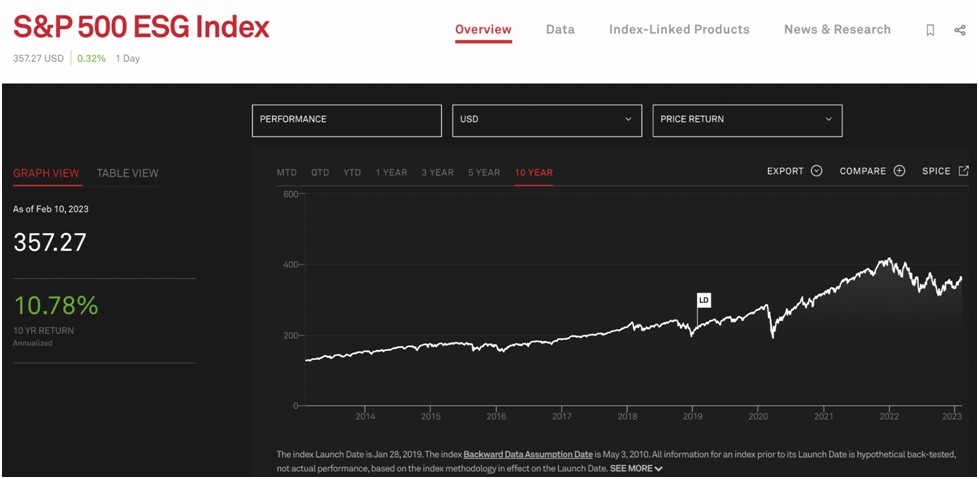Despite technology’s long-standing negative impact on the environment, today we’re seeing an explosion in the development and launch of sustainable technology, with more leading brands embracing their ESG credentials. With products focusing on carbon neutrality and even gamified learning surrounding sustainability, it appears that technology is evolving into a force for good in the battle to save our planet.
Not only is technology helping to bring more sustainability and efficiency, but it’s also making eco-friendliness pretty lucrative, as well. PR Newswire recently reported that the green technology and sustainability market will reach nearly $43.5 billion by 2030, as per P&S Intelligence research.
Likewise, we can take evidence from stock market outperformance that ESG stocks are clearly gaining value among investors. Representing environmental, social, and governance, ESG stocks represent companies that have delivered on sustainability-focused initiatives.

As we can see from the 10-year history of the S&P 500 ESG Index, the value of the index itself more than doubled in value between the Covid-19-driven crash of March 2020 and its peak in early January 2022.
Despite strong financial headwinds throughout 2022, the index is continuing to operate at a far higher level today than its launch date some four years ago. To accompany this growth, we’ve seen even more major brands and leading tech firms embrace their ESG credentials and develop cutting edge technology that focuses on sustainability.
How Tech Firms are Going Sustainable
South Korean tech giants Samsung have begun using eco-friendly materials in their smartphones from 2022, and incorporated a range of sustainable components in the production process of the latest in their Galaxy line: the S23 series. Launched in February 2023, the Galaxy S23 series utilizes recycled plastic and a host of other eco-friendly materials to reduce the product’s carbon footprint.
Furthermore, Samsung has declared that it intends to use 100% recycled plastic in its smartphones by 2050. “You might question what impact our campaign can have on the Earth’s environment, but it is quite a considerable amount given Samsung’s vast product portfolio,” said Park Sung-sun, Executive VP and head of Samsung MX’s Mechanical R&D Team. “We think it can have small but meaningful reverberations to each customer.”
The Galaxy S23 users recycled plastic for 12 internal components, which is twice the number of recycled materials used for components in its predecessor, the S22. This, Samsung believes, will help the company to reduce as much as 15 tons of discarded fishing nets from the oceans by the end of 2023.
Samsung isn’t the only firm with big ambitions in lowering their carbon footprint. Gartner data suggests that 87% of business leaders intend to increase their firm’s sustainability measures over the course of the coming years.
The data suggests that 75% of organizations will seek to ramp up their business with IT vendors that showcase these ESG commitments and timelines and look to replace those who have no such goals.
This implies that sustainable technology is not only highly appealing but essential in delivering the long-term viability of a company against the backdrop of ever-increasing environmental awareness.
Gamified Sustainability
Technology is also being used to reward users for taking their own sustainable initiatives in their daily lives through gamified applications.
In the UK, we’ve seen a partnership brokered between Raileasy and Swiss firm Axon Vibe to launch Sojo, an app that rewards users for using public transport, walking, or cycling–as opposed to driving a car–to get from A to B.
“Sojo incentivizes behavior change by providing citizens with rewards of monetary value, using money-saving vouchers,” said Jeremy Acklam, managing director of Axon Vibe. “when societal goal contexts are recognized through observed citizen movement data from our Sojo app.”
“Our experience on four continents shows this initiative to be the most effective way of delivering climate action outcomes to society. In 2022 we started to make Sojo available to partners in Great Britain.”
Sojo incentivizes walking in a similar way to a growing number of mobile applications with the ever-popular Pokemon Go augmented reality game and Sweatcoin, the latter of which pays users in cryptocurrency for the steps they take over the course of each day.
Facing Up to Fresh Climate Challenges
With the world’s population set to reach more than 10 billion by the year 2100, this increase in sustainability initiatives has come at a pivotal time in the battle to save the planet from exceeding the all-important 1.5°C limit set out in the 2015 Paris Climate Agreement.
While technology has played a significant role in contributing to the damage caused to the environment, the rise of ESG initiatives and sustainability-focused tech hardware and software could help to play a pivotal role in the pursuit of carbon neutrality.
Although the news on climate change can be a great cause for concern, we now appear to be in an age of fresh ESG-conscious tech. Whether the push for sustainability is gathering momentum at a fast-enough pace is still up for debate, but component by component, tech firms are waking up to their environmental responsibilities.
About the Author
Dmytro is a CEO at Solvid and founder of Pridicto. His work has been published in Shopify, Zapier, Make Use Of, VentureBeat, Mention, WordStream, BuzzSumo, and Campaign Monitor.




